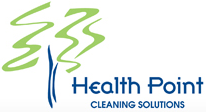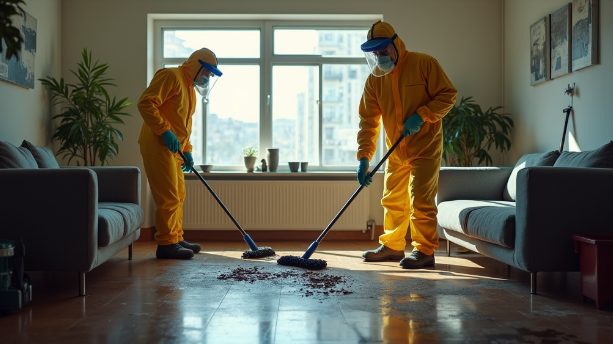Crime scene cleaning is a special job that helps restore places after a crime or accident. This work is not just about removing messes. It is about bringing safety and care back to an area.
Table of Contents
Key Takeaways
- Crime scene cleaning involves cleaning areas where crimes or accidents occur.
- Workers must deal with blood, waste, and other hazards.
- It is important to have proper training and certifications.
- Using personal protective equipment (PPE) keeps cleaners safe.
- This work can take an emotional toll, and mental health support is vital.
For those considering a career in this field, understanding the importance of hazardous material training is crucial.
Crime scene cleaning plays a key role in many communities. In Phoenix, Arizona, this need is real. The warm climate and busy lifestyle here can lead to accidents. Sometimes, these accidents can be serious. When they happen, crime scene cleaners come in to help.
What is Crime Scene Cleaning?
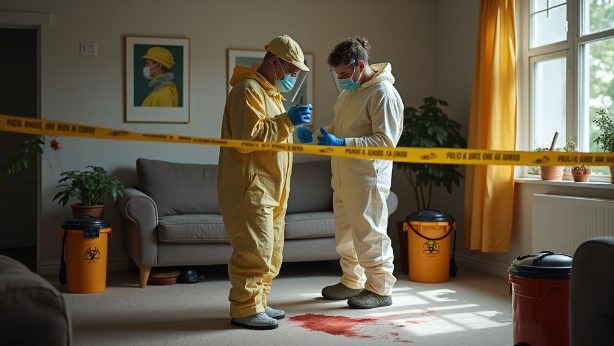
Crime scene cleaning is about making a place safe again after something terrible has happened. This can include situations like homicides, suicides, or even serious accidents. Cleaners remove harmful materials and restore the area to a safe condition.
The job requires a strong stomach and a desire to help others. It is not for everyone.
Why It Matters
When something tragic happens, the last thing affected families want is to deal with the cleanup. Crime scene cleaners take on this heavy task. They allow families to focus on what is truly important—healing and remembering their loved ones.
In Phoenix, crime scene cleaners are crucial. The city has a diverse population and a mix of urban and rural areas. This creates various situations where crime scene cleanup services are needed.
| Type of Situation | Description | Cleaning Challenges |
|---|---|---|
| Homicides | Clean-up required after violent deaths | Blood and bodily fluid removal |
| Suicides | Often involves emotional aftermath and biohazards | Personal items and emotional support |
| Accidental Deaths | Requires cleaning of various substances | Dealing with chemical spills |
| Natural Deaths | May involve decomposed remains | Significant odor and hazardous materials |
The Work of Crime Scene Cleaners
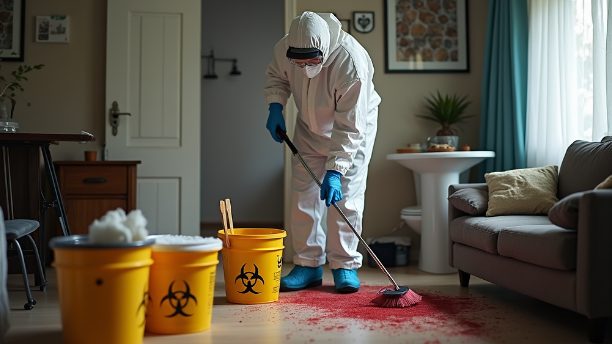
Crime scene cleaners have a tough job. They deal with everything from blood to bodily fluids. Their work helps to keep the community safe.
What Do They Clean?
- Blood and Bodily Fluids: This is the most common thing they clean. Blood can carry diseases, so it’s important to remove it properly.
- Crime Scene Evidence: Sometimes, cleaners have to be very careful not to disturb evidence. They work closely with law enforcement.
- Furniture and Personal Items: If items are bloodstained or contaminated, they may need to be thrown away.
- Environmental Cleanup: In cases of accidents, there may be chemical spills or other dangers that have to be cleaned up.
Tools of the Trade
Crime scene cleaners use many special tools. Some common ones include:
- Disinfectants: These kill germs and help eliminate harmful bacteria.
- Suction Units: These help remove liquids safely.
- Protective Gear: This includes gloves, masks, and suits to keep cleaners safe.
Additional Cleaning Equipment
- HEPA Filters: Used to purify air during cleanup.
- Ultraviolet Light: Helps detect bodily fluids not visible to the naked eye.
- Thermal Imaging Camera: Useful for identifying hidden moisture that can lead to mold.
The Skills Needed
Being a crime scene cleaner requires specific skills and training.
Physical Strength
Cleaners must do a lot of physical work. This can include lifting heavy items and moving furniture. Staying fit helps them handle the demands of the job.
Attention to Detail
Every little detail matters. Cleaners must notice things that others might overlook. Missing a spot can mean leaving behind dangers.
Emotional Resilience
Seeing terrible things can take a toll. Cleaners need to handle their feelings well. They must know how to cope with the stress and sadness that comes with the job.
Training and Certifications
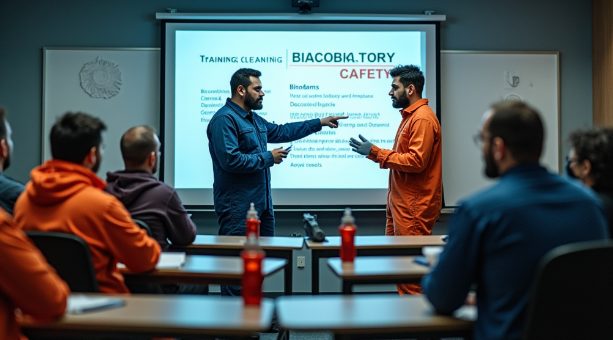
Before becoming a crime scene cleaner, training is essential. Each state has its own rules, but some basics are the same.
Required Training
- Hazardous Material Training: Cleaners learn how to handle dangerous materials.
- Bloodborne Pathogens Training: This teaches how to deal with blood safely.
- Specialized Crime Scene Cleanup Courses: Some training focuses specifically on crime scenes, covering legal and safety aspects.
Certifications
Many cleaners get certifications to show they are qualified. This can make finding jobs easier and provides peace of mind to clients. Some examples of certifications include:
- OSHA Certification: This ensures workers understand safety standards.
- IICRC Certification: This focuses on cleaning and restoration.
Emotional Challenges
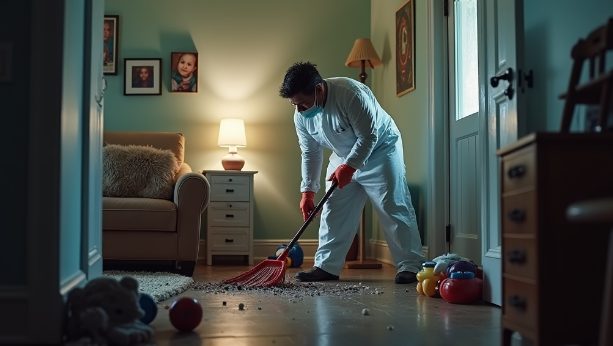
Crime scene cleaning can be emotionally challenging. Cleaners see a lot of pain and sadness. It can be tough to cope with these feelings.
Coping Strategies
- Support Groups: Talking with others who do similar work can help.
- Therapy: Speaking with a professional can provide tools to handle tough emotions.
- Healthy Outlets: Finding hobbies or activities to relax can make a big difference.
Importance of Mental Health
Mental health is crucial in this job. Taking care of oneself helps cleaners perform their best. Employers should support workers by offering resources and understanding.
How to Find a Job in Crime Scene Cleaning
If you’re interested in this field, knowing where to start is helpful.
Research Local Companies
Look for cleaning companies that specialize in crime scene cleanup in Phoenix. Many local businesses offer these services. For example, companies that focus on biohazard cleanup can be a great resource.
Networking
Connect with others in the field. They can provide tips on job openings or share their experiences.
Prepare for Interviews
When applying, be ready to explain why you want the job. Show that you’re serious and willing to learn.
| Area of Focus | Training Topics | Potential Employers |
|---|---|---|
| Biohazard Cleanup | Handling bloodborne pathogens, hazardous materials | Specialized cleaning companies |
| Emotional Support | Coping mechanisms, mental health resources | Hospitals, mental health facilities |
| Safety Standards | OSHA compliance, PPE usage | Industrial cleaning firms |
Conclusion
Crime scene cleaning is a vital service that helps communities heal. It requires training, strength, and emotional resilience. In Phoenix, this work is crucial for those affected by tragic events.
If you feel drawn to this line of work, take the first step. With the right training and support, you can help make a difference in your community.
Your role will be more than just cleaning. You will bring comfort and safety back to those in need.
What You Can Do
If you’re looking for a meaningful career, consider crime scene cleaning. It may not be easy, but it is rewarding. You can help others in their darkest times.
Remember, you are not alone on this journey. Many support systems are available to help you succeed. Reach out, get trained, and be ready to make a change. For more information, you can visit our website or contact us.
